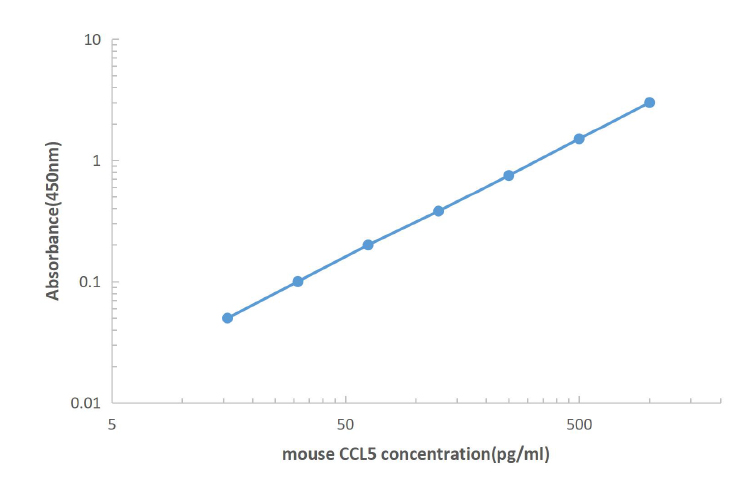Mouse Ccl5 ELISA KIT (96 T)
Size
Other products for "Ccl5"
Specifications
| Product Data | |
| Format | 96-well strip plate |
| Assay Type | Solid Phase Sandwich ELISA |
| Assay Length | 4 hours |
| Signal | Colorimetric |
| Curve Range | 15.62-1000pg/ml |
| Sample Type | Serum, plasma, Cell culture supernatant |
| Sample Volume | 100 uL |
| Specificity | This assay recognizes both natural and recombinant mouse CCL5. |
| Sensitivity | 8pg/mL |
| Reactivities | Mouse |
| Interference | No significant interference observed with available related molecules. |
| Components |
|
| Background | RANTES (Regulated upon Activation, Normal T cell-expressed, and presumably Secreted), also known as CCL5, a member of the CC chemokine family of inflammatory and immunoregulatory cytokines, initially discovered by subtractive hybridization as a T cell-specific molecule. Mouse RANTES cDNA encodes a 91 amino acid (aa) residue precursor protein with a presumed signal peptide of 23 aa residues that is cleaved to generate the 68 aa residue mature protein. At the amino acid sequence level, mouse RANTES is 84% identical to human RANTES. Both human and mouse RANTES exhibit cross species activity. Cells known to express RANTES include keratinocytes, eosinophils, platelets, endothelium, fibroblasts, respiratory epithelium, astrocytes, vascular smooth muscle, and CD4+ and CD8+ T cells. As suggested by its acronym, RANTES production by the various cell types is induced in response to cytokine stimulation. |
| Gene Symbol | Ccl5 |
| Gene ID | 20304 |
Documents
{0} Product Review(s)
0 Product Review(s)
Submit review
Be the first one to submit a review
Product Citations
*Delivery time may vary from web posted schedule. Occasional delays may occur due to unforeseen
complexities in the preparation of your product. International customers may expect an additional 1-2 weeks
in shipping.






























































































































































































































































 Germany
Germany
 Japan
Japan
 United Kingdom
United Kingdom
 China
China
